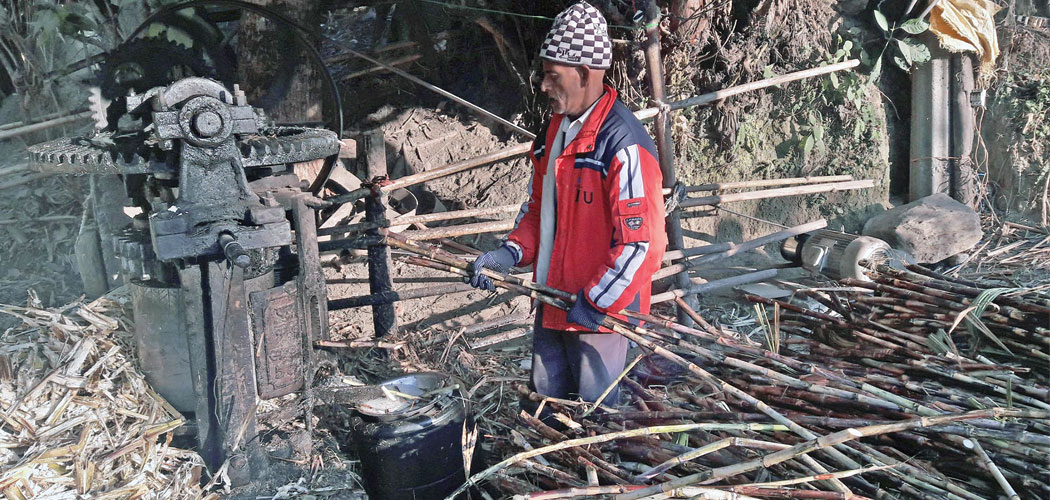Pokhara Metropolitan City-32, Dhodabensi: In the heart of Dhodabensi, a community nestled within Pokhara, local farmers are braving the chill of Poush and Magh to uphold a fading agricultural tradition—sugarcane farming and molasses production. While the season brings hard work and sleepless nights, it also offers hope and livelihood to over 50 households in the region.
Keeping the Tradition Alive
For Ishwar Adhikari, a sugarcane farmer cultivating three ropanis of land, the day begins early with household chores before heading to a nearby sugarcane mill. Here, he dedicates hours to processing molasses. Despite the challenges, including late-night shifts to cook the syrup, Adhikari earns around NPR 200,000 annually from his efforts.
“We face significant difficulties, from cultivating sugarcane to producing molasses. Cooking molasses overnight is exhausting, but it’s our way of life,” Adhikari shared.
Molasses, or khudo, remains a sought-after product during this time of year, with a mana fetching NPR 200 and a tin selling for NPR 5,500. However, Adhikari lamented the limited market reach. “We produce khudo, but without proper market access, our production might decrease. Promotion and transportation support are vital,” he added. Currently, their molasses reaches only Kaski, Lamjung, and Tanahun districts.
A Lucrative Yet Strenuous Livelihood
For farmers like Laxman Ojha, sugarcane farming offers a sense of fulfillment and economic stability. “Growing sugarcane is something I enjoy. Selling khudo can earn enough to sustain us for a year. However, we can’t produce as much as before due to reduced land use and aging farmers,” Ojha explained.
Seasonal earnings from sugarcane farming in Dhodabensi range between NPR 60,000 and NPR 200,000. Despite the promising income, the labor-intensive process and lack of modern equipment hinder production.
The Need for Modernization and Support
Farmers emphasized the importance of government intervention in sustaining sugarcane farming. Ojha highlighted the need for subsidies and advanced molasses filtering machines to reduce the workload and increase efficiency. “It takes 5-6 hours to cook molasses. If this process becomes easier, more people would be willing to cultivate sugarcane,” he said.
Reflecting on the past, when oxen-powered mills were common, locals expressed satisfaction with the introduction of machinery. However, they believe more needs to be done to modernize the sector and attract younger generations to this traditional craft.
A Call for Action
Dhodabensi’s sugarcane farmers represent a resilient community striving to preserve a tradition that not only supports their livelihoods but also serves as a cultural identity. With proper support from the government and stakeholders, this small farming hub could expand its market reach and production capacity, ensuring the survival of this age-old practice for generations to come.
Ecosphere News
By focusing on the intersection of tradition, sustainability, and rural livelihoods, Ecosphere News brings you stories of resilience and change.